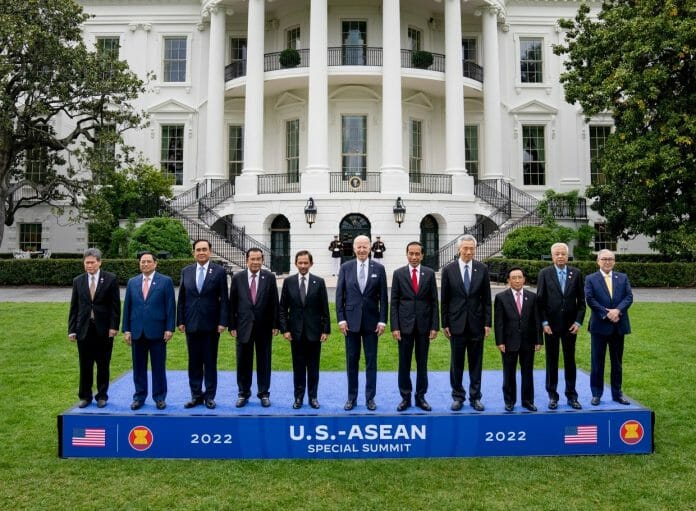ASEAN and the United States gathered on the occasion of the ASEAN-U.S. Special Summit, the first to be ever held, the leaders met and came to a consensus on many areas while many more issues were open to being discussed.
The member nations of ASEAN barring Myanmar, emphasised the importance of adhering to key principles, shared values, and norms enshrined in the Charter of the United Nations, the ASEAN Charter, the Declaration on Zone of Peace, Freedom, and Neutrality (ZOPFAN), the Treaty of Amity and Cooperation in Southeast Asia (TAC), the 1982 United Nations Convention on the Law of the Sea (UNCLOS), the Treaty on the Southeast Asia Nuclear Weapon-Free Zone (SEANWFZ) and the ASEAN Outlook on the IndoPacific (AOIP);
Further reiterating, the importance of creating a peaceful environment for further enhancing cooperation and strengthening the existing bonds of friendship among our countries in keeping with the principles of equality, partnership, consultation, and mutual respect, guided by the principles of the East Asia Summit (EAS) Declaration on the Principles for Mutually Beneficial Relations (Bali Principles);
Among current issues raised include maritime security, especially in the South China Sea, and recognise it as a sea of peace emphasising the importance of practical measures that could reduce tensions and the risk of accidents, misunderstandings, and miscalculations. Nations stressed the importance of undertaking confidence-building and preventive measures to enhance, among others, trust and confidence amongst parties. We further reaffirmed the need to pursue peaceful resolution of disputes in accordance with universally recognized principles of international law, including the 1982 UNCLOS.
The region is committed to continuing to advance stronger, more equitable, more inclusive economic growth and sustainable development, including through the implementation of the ASEAN-U.S. Trade and Investment Framework Arrangement and Expanded Economic Engagement Initiatives Workplan, and through the vital economic participation of the U.S. in the region.
- Nations are prepared to work to meet the region’s infrastructure needs by catalyzing investment in high-standard, transparent, low-carbon, and climate-resilient infrastructure projects that advance inclusive and sustainable economic growth that meet applicable international labor standards and environmental protections. We are committed to continuing to cooperate to promote trade and investment and facilitating resilient global supply chains and seamless regional
connectivity, including for essential goods such as medical supplies, medicines, vaccines, food and agricultural products, commodities, high-tech products, and other essential supplies and services, contributing to sustainable
economic recovery and resilience in the region. - And deepen collaboration on transport connectivity, including air, land, maritime, and transport facilitation program to advance sustainable infrastructure development and support emerging technologies, including electric vehicles
ASEAN is also ready to play its role in climate change and sustainable economic development, ready to implement policies and initiatives toward biodiversity conservation and ethical manufacturing. Also resolve to work together to conserve its natural capital, including through preventing, halting, and reversing deforestation, and the degradation of ecosystems, as well as the restoration of critical ecosystems including forests, wetlands, coastal and marine ecosystems, and the continued collaboration with the ASEAN Centre for Biodiversity.









